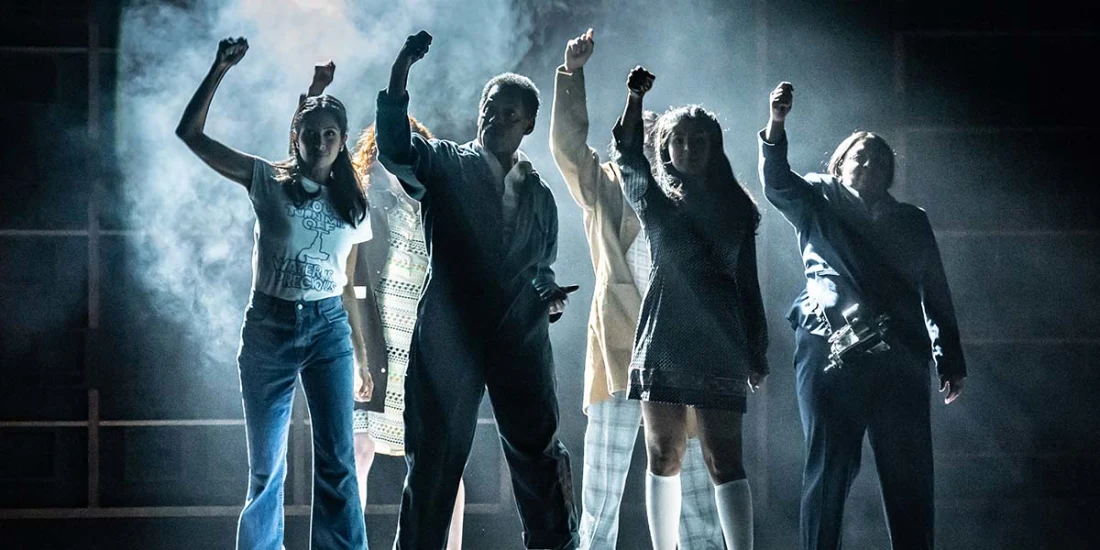'NW Trilogy' review - a collection of multicultural plays showcase London's vibrant history
NW Trilogy centres on the people who once resided right on the doorstep of Kilburn's Kiln Theatre where the piece makes its debut. It's a beautifully realised collection of plays where audiences are taken on a vivid tour through the vibrant history of north west London during the 1960s and 1970s. As part of a commission from the Brent Borough of Culture, the plays showcase the lived experiences of the immigrant communities at the time and how they wrestled with adversity.
Dance Floor is the first in the trio of plays. Aoife (Claire Keenan) has left her home town in Kerrykeel in Donegal and is doing a trial shift as a cleaner in the hopes of finally finding paid work in London. Showing Aoife the ropes is resident Irish cleaner, Katie (Aoife McMahon). As the pair diligently clean up the mess in the dancehall from the night before, we gain an insight into how Aoife's expectations of life in London have painfully diverged from the reality. Aoife laments "I thought that jobs grew on trees here. I've tried for a lot and I keep getting 'No Irish'".
Writer Moira Buffini sensitively uses the personal to illuminate the socio-political issues of the time and Keenan and McMahon deliver glistening performances which give a lot of heart to the cruel tale. The play comes to an endearing end when Sean (Emmet Byrne) meets Aoife in his search for a lost item in the dancehall and we see how an unexpected act of kindness from a stranger can go a long way.
Next up is Life of Riley where a Black reggae musician has a messy reunion with his mixed-race nineteen year old daughter Paulette (Harmony Rose Bremner.) Here, writer Roy Williams also examines the struggle against adversity but delves deeper into how individual choices mould the life that you eventually lead. Riley (Chris Tummings) clings to an industry that is rapidly moving on without him and is confronted with how his decision to pursue music has come at a cost. With Tummings's moving portrayal, his struggle to accept that his golden days have come to an end feels palpable.
Paulette also faces challenges of her own. Due to her mixed-race heritage, she struggles to know exactly where she belongs. The father and daughter clash in the beginning moments of their encounter but by the end, the ice begins to thaw as they sing a tender rendition of Nina Simone's "Young, Gifted and Black." Although there's still a lot of healing left to do, there may still be hope for their relationship yet.
Waking/Walking is the final play and set against a backdrop of the 1976 strike at Dollis Hill's Grunwick plant by Asian women. One of the workers, Anjali (Natasha Jayetileke) is torn as to whether she should participate in a protest. She would like to maintain solidarity with the women who have shown her unwavering support during her time of need. But she knows that in doing so, she would be disobeying her misogynist husband Deepak (Ronny Jhutti) who belittles the difficulty that she experiences.
Suhayla El-Bushra's short play is comedic in parts but mostly maintains a cheerless tone as the family faces a myriad of difficult problems. However the play ends on a powerful note as Anjali fights back not only by drawing strength from her fellow female workers, but also by drawing inspiration from her teenage daughter who recently participated in an anti-racism protest.
There's much to learn from the three plays. Each reveals the vast changes we've experienced in the years since the sixties and seventies but also offers a reflection on how many things have not changed at all. Gone are the days of using cassette tapes and dialling from red telephone boxes using 2p coins. But issues around reproductive rights, structural racism, and the struggle against poor working conditions remain just as live now as they did a few decades ago. Each play also captures not only the hostility faced by immigrants from wider society but also the rife prejudices in and amongst each of these groups. Anjali comments on how "Deepak always said Black people were lazy. I've added it to the list of things he was wrong about. It's a f*cking long list".
The overall production feels seamless thanks to co-directors Taio Lawson and Susie Mckenna who have drawn out strong performances from the ensemble cast. NW Trilogy is an important piece of theatre that celebrates the varied immigrant stories which make up our multicultural society and ensures that these are not forgotten.
Photo credit: NW Trilogy (Photo by Marc Brenner)
Originally published on
